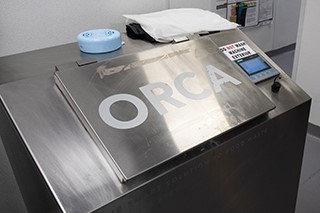With the recent removal of biodigester ORCA, the Student Green Energy Fund is exploring alternative plans to combat food waste on campus.
By Katie Sing Community & Culture Beat Reporter
The ORCA, a food waste management biodigester, was quietly removed from the University of South Florida St. Petersburg’s dining facility “The Nest” in early February.
Established in 2019, the ORCA was supported by the Student Green Energy Fund to target campus food waste reduction. However, with the growing student population, increased technical malfunctions with the biodigester led to its inevitable removal.
Exclusively working with ORCA’s company under contract, USFSP was the first Florida university to use this cutting-edge technology on its campus grounds.
By using oxygen, water and microorganisms, the biodigester had a reliable job in the Nest kitchen by helping dining staff break down non-edible food waste left by students. Transforming the broken-down waste into a liquid, it’s then transported through a filter and disposed into a sanitary sewer system in a sustainably safe fashion.
Matthew Cimitile, the assistant director of communications at USFSP and the staff advisor of SGEF, understands the student body’s concern regarding food waste on our campus.
“The students I interact with, climate change is always at the front of their mind, and you know the reason you want to compost and deal with food waste is that food waste is a huge emitter of greenhouse gases when they’re put in landfills,” Cimitile said.
When ORCA came to campus in August of 2019, USF’s magazine reported it was responsible for steering 8,466 pounds of food waste away from landfills.
Before The Nest was built in spring 2021, the ORCA was originally in the University Student Center, USFSP’s main cafeteria at the time. After The Nest was created, the ORCA was rehomed to its new location.
However, with the gradual increase of incoming students in the past academic years aiding the campus’ continual growth, the amount of food waste has been overwhelming the biodigester. This eventually led to the decision to part ways with ORCA.
Iris Van Der Veen, an environmental science major and chair for SGEF, further explains how USFSP’s student population growth led to the removal of ORCA.
“We have such a large student population that it can’t handle the amount of food waste that we produce,” Van Der Veen said.
“Our student population has grown each year and because of that, it wasn’t able to take all of that food waste because that’s not what it was made for,” she said. “It was made for a smaller-scale school. We weren’t planning on growing that much.”
According to FoodPrint, more than 22 million pounds of food gets thrown away by U.S. colleges annually. Food waste sent to landfills is a known contributor to greenhouse gases due to its release of carbon dioxide and methane gas – one of many leading causes of climate change.
Posing as an environmental challenge, USFSP addresses this through the help of their SGEF student-led team. In response to the removal of ORCA, the SGEF team has been considering possible solutions to continue their food waste management efforts.
Cimitile raises a valid point of the importance of reanalyzing the statistics of how much food waste the dining hall generates.
“Since we removed the Orca, they’re installing this thing called Lean Path. Basically, it’s a scale to measure how much food waste dining is generating per day,” Cimitile said.
From this system alone, they are estimating around 100 pounds are produced per day at The Nest.
Besides Lean Path, there are current discussions of replacing the biodigester with a composting system. Composting could be tricky as some process certain waste and have different limits, which can be a recognizable problem when it comes to meticulously sorting through a varied amount of student food waste.
Jim Ivey, an environmental science professor at USFSP and a faculty member under SGEF, weighs in on their consideration of having a commercial composter on campus to combat this issue of food waste.
“Orca put out a liquid… and you can eventually get a useful product out of it, but the nice thing about composting is it comes out already ready. You just mix it with a certain proportion of your soil,” Ivey said.
Ivey emphasizes the different opportunities for the usage of compost on this campus such as working with neighboring organizations, restaurants and community farms in giving out compost. With the idea of composting on our school grounds, it would also ideally work in conjunction with revitalizing our school’s community “Food Forest.”
USFSP Food Forest lives behind Pelican Apartments and is being redeveloped to restore it to its original state and purpose as a student-maintained communal source of food.
“The food forest was a really productive community garden up until the pandemic,” Cimitile said. “Our goal is to replant the food force as a potential fund funding with a local urban agriculture organization to help us replant it and make it productive again.”
Apart from the restoration efforts of the Food Forest, different plans to sustainably better the campus through SGEF’s agenda. Some of those plans include bringing in new bikes for the student population to rent out and fixing some of the solar-powered benches.
With a continual commitment to USFSP’s aim for a sustainable green campus, ORCA was one of the many steps our campus will continue to implement to better waste management solutions on school grounds through the efforts of dining and SGEF.

